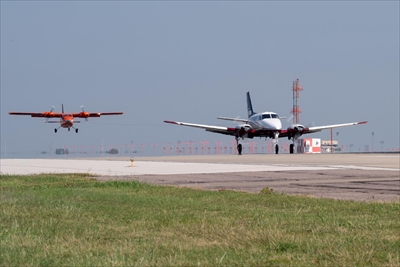Planes, trains and automobiles can be seen moving in AllianceTexas in north Fort Worth, but a start-up aviation company says making a “sky train” is starting to come to fruition in the area.
The company, Aerolane, announced its headquarters at Perot Field Fort Worth Alliance Airport in April. During an Oct. 1 event at the airport, a crowd that included Hillwood executives, investors and U.S. Congressman Jake Ellzey saw Aerolane’s towed cargo glider technology in action as a plane took off with another plane tethered behind it.
Aerolane, which consists of former executives from Prime Air and BNSF, envisions using gliders to tug cargo as a way to save energy for future customers and make air cargo transportation more efficient.
The trial flight marked an important milestone for Aerolane, which has been testing its technology for months out of Reese Airpark, a decommissioned air base in Lubbock.
Aerolane co-founder and chief commercial officer Prescott Watson described Perot Field as a much busier and complex airspace than Reese. The airport is a major hub for Amazon Prime Air and FedEx, and is home to the BNSF Railway Alliance Intermodal Facility. Perot Field saw 628.7 million pounds of air cargo arriving and departing the area last year, according to data from the Texas Comptroller.
“It is a huge deal that we have gotten to the point where we can show that towed flight or aero towing is not only something that saves a tremendous amount of fuel, but it can be done repeatedly, and it can be done in a complex environment without interrupting commercial operations,” Watson said.
Now, Aerolane is waiting for certification to implement its technology on a commercial scale. The company is currently going through a series of design approvals from the Federal Aviation Administration to convert existing aircraft into tow gliders. Customers have already signed up for the tow technology, known as the AC0. Watson said Aerolane contracted $300 million with a customer described as a large regional carrier, but would not disclose the name of the company.
Watson described the customer as “one of the most important and largest regional carriers that serves the United States, but also flies to and from Mexico, the Caribbean, Canada.
“So it’s a large airline well north of 100 planes, big presence on the West Coast, as well as in Texas,” he said.
The carrier uses planes that transport more than 7,500 pounds of cargo.
Todd Graetz, CEO and co-founder of Aerolane, said the company is starting with smaller air cargo carriers as a gradual way to bring the technology to the FAA, and start making an economic impact.
“Everybody gets excited about the really big planes, but the real huge near-term economic impact comes from the smaller planes that take care of the 200 underserved airports,” he said.
George Kirov, Aerolane’s head of strategy, said he thinks the company’s technology and gliders will be attractive because it will help companies save money on fuel and repairs.
While much of Aerolane’s early attention has been focused on engineering, testing and certification of its aircraft, the company is now entering its next phase.
“We have to get investors to fund us to produce the orders,” he said.
If all goes well for the company, Aerolane executives such as Graetz imagine hundreds of employees working out of Alliance assembling the company’s future aircraft designed for towing technology.
